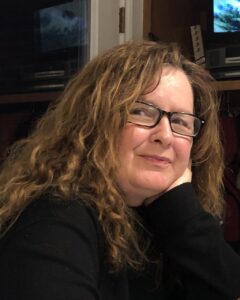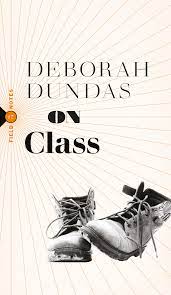 Life has a funny way of upending plans, and nobody knows that better than Deborah Dundas, MFA’23.
Life has a funny way of upending plans, and nobody knows that better than Deborah Dundas, MFA’23.
Deborah applied to the King’s MFA with a plan for a book she wanted to write about her husband’s journey to find his biological family. He had been placed for adoption in Northern Ireland during the 1970s in the midst of the region’s political strife.
But shortly after Deborah received her acceptance letter, she had a conversation with the publisher of Biblioasis, a contact she knew from her work as a journalist and editor. In passing, he told her about their Field Notes series, a set of short nonfiction books aimed at examining social issues. They started to brainstorm potential topics, and eventually came to the idea of “class,” something they both admitted to having complicated feelings about. It was mid-pandemic, and socioeconomic inequity was dominating the headlines.
He invited Deborah to send him a book proposal, which led to a publishing contract — all before her MFA program had even begun. That book, On Class, launched May 9, 2023, just in time to coincide with Deborah’s graduation from the program.
 “With the pandemic in particular, issues of class came to the fore because the way you were able to weather the pandemic depended entirely on what class you were a part of — whether you were a grocery store worker or whether you were an executive who could work at home, whether you lived in an apartment with no balcony and had a couple kids, or whether you could escape to the lake house and still live as though you still had some freedom.”
“With the pandemic in particular, issues of class came to the fore because the way you were able to weather the pandemic depended entirely on what class you were a part of — whether you were a grocery store worker or whether you were an executive who could work at home, whether you lived in an apartment with no balcony and had a couple kids, or whether you could escape to the lake house and still live as though you still had some freedom.”
Despite the fact the pandemic was impacting livelihoods — and even killing people — at wildly different rates based on their socioeconomic class, Deborah realized it was still a topic people weren’t used to discussing candidly.
“I think there’s a lot of shame around it,” she says. “If you’re poor, you don’t want to admit that you’re poor … and if you’re in the upper classes, people don’t talk about it because they don’t want to be maligned. From all sections, it’s just easier not to talk about it.”
Because Deborah began the program with a book deal in place, she was beholden to external deliverables from her publisher, but found her program mentors essential, both in providing support and in helping review chapters before she submitted them to her editor. After all, despite having worked in journalism for most of her adult life, including stints as a broadcast writer at CTV and TVO before becoming the Toronto Star’s books editor, it was her first time being edited by a publishing house.
“David (Hayes) talked me off the ceiling a bunch of times,” she says. “[He] was really good because I was feeling a little lacking in confidence as to my ability to pull off a book project. He was instrumental in guiding me through, helping me understand the various insecurities and processes that a writer goes through on a very tight editorial timeline.”
Author Ken McGoogan, who mentored Deborah in her second year of the program, had a keen eye for structure and helped her develop and polish a formal book proposal and chapter outline for a second book project she has in the works, a collection of stories about adoption that’s under contract with Simon & Schuster.
“They gave me discipline and approach about how you have to approach your writing,” she says. “And about reading it, and talking about writing, talking about how things come together, creating scenes.”
Deborah, like many students who apply to the King’s MFA program, has a background in journalism, but discovered there’s always more to learn.
“It sounds funny because I make my living as a writer, but it really made me feel like a writer,” she says of the MFA program. “When you talk about writing books, it’s a different ballgame. It’s also about having confidence in your own voice because …when you’re writing a book, it comes from you, it’s in your voice. I think if you’re a writer of one thing, you think you’re a writer, but transitioning into being another sort of writer, it’s different. You can question yourself a bit. [The program] really helped with that transition.”
You can find out more about the King’s MFA programs here.

